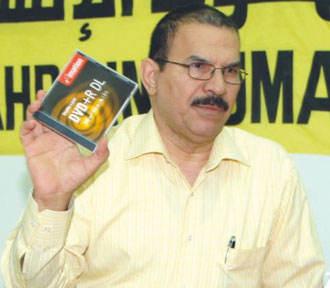
|
 |
 |
|
|
|
|
|
|
|
|
|
|
|
|
|
|
|
|
|
|
|
|
|
|
Politicization Removes DraziEarthquake in Bahrain Human Rights MovementAnyone who follows the activities of the Bahrain Human Rights Society, the first human rights society established during the reform era, knows that it had achieved a great deal during the leadership of the recently resigned Abdullah Drazi. Drazi contributed significantly towards the development and maturity of the Society as well as building bridges with the official authorities concerned with human rights.
Despite being a leading human rights activist, Drazi remained a member of the political society Wa’d, claiming that his political affiliation did not conflict with his human rights activities. However, Drazi should by now be aware that the political position of Wa’d has limited his freedom of expression with regards to human rights issues. The breaking point for Drazi came after his statement on 9 February 2010, when he praised the courageous steps taken by the King during the reform project, such as cleaning prisons, returning exiles and abolishing the State Security Law. Drazi also praised the Government’s openness and its unprecedented expansion of freedom of expression to the extent that a conference was held in Bahrain to discuss a very sensitive issue (he was referring to the Human Rights Watch conference on torture). He also said that it would have been impossible to hold such a conference in the country 10 years ago. Drazi also praised the Ministry of Interior and its Minister for his reform steps, and gave examples of his cooperation with the Society, describing the relationship between the Society and the Ministry as ‘good and improved’. He also pointed to the fact that the security officials whose names were mentioned in the HRW report have nothing to do with the issue of torture. The political movement Wa’d was obviously displeased with these statements, so the political pressure mounted on Drazi, pushing him to resign. The duality of political and human rights affiliation as well as the dominance of political societies over the human rights field, have transformed human rights activism into merely a political tool. This means that the visions of human rights societies have become governed by politics, forcing activists to adopt specific opinion, which they do not necessarily believe in. This also pushes them to accept evaluations of the human rights situation based on a political judgment. Not only does political polarization contribute in isolating these societies, it also clashes with official and civil bodies. We have early warned of the consequences of politicizing human rights despite our awareness of the circumstances of democratic change, and the relatively new experience of political and human rights in the country. The negative results of connecting human rights with political affiliation have now appeared, highlighted not only by the experience of the Bahrain Human Rights Society (BHRS) and the Bahrain Centre for Human Rights, but also evident in the experiences of many other human rights societies, who were busy either in finding excuses for violations or denying that they ever took place. The writer Sawsan Al Shair has equated both parties by saying: (one group was unsuccessfully polished by the Government and this group denies any allegations, whilst the other group believes any allegations against the Government), (Al Watan 05/02/2010). Saeed Al Hamad wrote that ‘the resignation of Drazi reflects the predicament of the human rights and politics duality’ and that Drazi ‘was its victim’. He continued by saying that the resignation ‘reflects the effect of this duality on anyone who is both a party member and a human right activist, who should supposedly be independent from any political influence. Most human rights societies suffer from this particular problem’. We find this analysis both accurate and correct. (Al Ayam 17/02/2010) The Minister of Interior noticed this and commented on the crisis of the BHRS by saying that it is necessary to work towards stripping members of some civil societies (especially human rights societies) of their political affiliations, so that their civil role is not affected by a political one. (The Minister of Interior addressing parliamentary committees, 15/02/2010). We regret the resignation of Abdullah Drazi and we very much hope that he will return to the human rights field, which needs individuals like him. We are concerned that the new human rights society Salam (which is in the process of being formed) will fall into the same trap. We hope that the society will be established in the near future, however we advise our brothers in both Al Wifaq and Salam society to separate human rights and politics and call upon political figures in Al Wifaq not to influence the activity of their colleagues in Salam. This will weaken Salam and render it useless in politics and becomes a mere media organ in political conflicts. In order to achieve this separation, Salam’s founders (be they members or leaders) should resign from their political positions in Al Wifaq. Salam should also be financially independent and place strict restrictions on their human rights performance to avoid slipping into politics or becoming partial to its allies. Finally, it should adhere to human rights standards so that its establishment constitutes a real step in the development of Bahraini human rights. |
